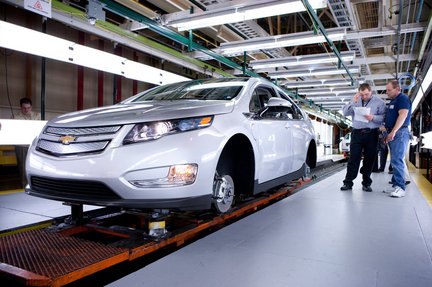Chevy Volt Priced Starting At $41k, Leases Start At $350/Month
This, ladies and gentlemen, is a moment we’ve been waiting for for some time… which might explain why the news isn’t particularly earth-shattering [ press release here]. Yes, believe it or not, the Volt will cost $41,000 base including destination charge, just as every bit of speculation has indicated since the Volt was first announced. Perhaps more surprising is GM’s announcement of lease deals starting at $350/month for 36 months with $2,500 down. But just as GM has found with its CTS, moving high-cost American-branded metal in any kind of volume tends to require heavy dependence on leases. Plus, the fact that the big question mark surrounding EVs in general continues to be long-term battery life makes leasing the obvious option for those who are tempted by the Volt, but don’t want own a lot of expensive, unproven technology. On the other hand, the Feds don’t subsidize EV leases, and with a Federal tax credit, the Volt’s price drops to a mere $33,500… which is less than a thousand dollars more than the Nissan Leaf’s base price (without tax credit, $25,280 with). Obviously the Volt has certain advantages due to its EREV design, but with the economy still shaky, the Volt’s hefty price premium will work against it, especially as volume builds. Seeing how these two very different EVs do relative to one another will make for some interesting lessons about the future of the electric car.
More by Edward Niedermeyer


































Comments
Join the conversation
I drive 14 miles, non-freeway, round-trip each day to/from work. If I ONLY drove that car to work, with a 1/4 tank of gas, I would (concievably) never use that 1/4 tank of gas (if I plug in every night at home). Now, consider I could still get 40 to 50 mpg if I decide to go on vacation, or drive across the country, then I'm getting what I would with any highly fuel efficient small ICE car. What's the benefit? I only have to own one car. Not two, which cold bring my total vehicle cost to well over $41k. I have two words about the Leaf. "Range Anxiety". Let's not forget that Fisker is planning on using, essentially, the same type of technology and is counting on a similar price of around $40k for its sedan.
This will be the most recalled vehicle in Gm's (old and New) history.
I'm still a doubter, at least for use in my situation. Before I could decide anything, I'd like to see some performance figures - and real world performance figures at that. I know that electric motors give great torque, and that the motors in the Volt give the equivalent of 140 HP. Those points conceptually sound great. However, I live in Dallas. I drive 38 miles a day when commuting. Dallas has the distinction of either being damn hot or damn cold. Thus you have to factor in the range diminishment and power losses caused by using the A/C when it's 100 degrees F or the heat when it's 34 degrees F. Additionally, with freeway use, you're going to lose more range. Speeds here are normally between 65 - 75 mph. My current car has an average speed calculator, and over the course of a week, with city and freeway driving combined, I average 37 - 39 mph. When you figure in the amount of miles that are spent on surface streets going slowly, that average includes some "skippin' along" on the freeway. I understand that the Volt will supplement its range with its ICE but what kind of performance do you get from that 71 HP generator with the A/C on?. I don't know much about physics, but I'm having trouble with conceptually grasping getting 140 electrical HP out of a 71 HP input. Note: I'm getting these figures from Wikipedia, so they may well be wrong. If so please don't hesitate to correct me. http://en.wikipedia.org/wiki/Chevrolet_Volt Additionally if it IS possible to get 140 HP output from a 71 HP input, please don't hesitate to correct me there as well.
Lokki: "Dallas has the distinction of either being damn hot or damn cold." You should have warned us to put down the coffee... At least, warned those of us in Minnesota. A temp of 34F is nothing. A temp of -34F, now that's something. Lokki: "I understand that the Volt will supplement its range with its ICE but what kind of performance do you get from that 71 HP generator with the A/C on?. I don’t know much about physics, but I’m having trouble with conceptually grasping getting 140 electrical HP out of a 71 HP input." The thing is predicated on the notion that you don't need 150hp at the wheels all the time, 20-30hp is more like it. The Volt runs the 74hp generator as necessary to recharge the battery.